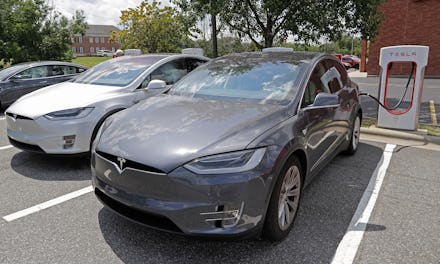Tesla just inadvertently made the case for good old-fashioned car keys

Yesterday, some Tesla drivers winding down from their Labor Day holiday were met with an unpleasant surprise. Last night, for approximately four hours, a swath of Tesla owners were locked out of their vehicles as the app went down for maintenance. Folks who depended on the app to get into their cars were stuck waiting for the downtime to end, reported NBC Bay Area, with at least one driver in California hailing an Uber to get home when she couldn't wait for the app any longer.
Tesla offers numerous ways for drivers to access their cars, which range in price from about $35,000 to $81,000 (depending on the model). One is the Key Fob, which is basically a remote key shaped like a miniature Tesla. The second is by using a key card that can unlock the car with a tap. The third method uses the Tesla app — though this incident shows that it might not be the most reliable in a pinch.
As Tesla drivers fled to Twitter to complain, other users insisted that a Bluetooth connection should still allow drivers to get into their cars. But reports from the stranded drivers were mixed; some people were able to get into their cars, while others couldn't due to being logged out or other errors.
Tesla's customer service was overwhelmed with callers and, according to comments online, were unable to help drivers with unlocking their cars. Users who relied solely on the app could do nothing but wait until the app was working again.
As of this writing, Tesla has yet to make a public statement about the incident.
'Always connected' and 'smart' tech items are fun to use, but seem to expose many flaws in practicality during inopportune moments. Earlier this month, a brand of smart ovens reportedly switched on in the middle of the night, startling users who woke up to ovens at broiling temperature. In July, a user on Twitter made a humorous post about their smart water bottle — a device they couldn't use until it finished updating. Earlier this year, in February, a firmware error bricked Nike's self-lacing shoes when the app couldn't connect properly to users' footwear.
These incidents seem to be telling us that perhaps staying simple, and disconnected, is for the best. Or — at least in Tesla's case — we should probably always keep some kind of backup on hand. Just in case.